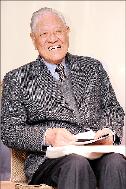Former president Lee Teng-hui (李登輝) yesterday said Taiwan should replace the Republic of China (ROC) Constitution with a new constitution that reflects modern realities.
Lee said the ROC Constitution, enacted in China in 1947, is not suitable for Taiwan and should be replaced by a Taiwan basic law and that ultimately a new constitution should be enacted.
Lee made the remarks during an event organized by Taiwan Advocates in Taipei with four academics who were representatives of a student movement in 1991 known as the Wild Lilies (野百合學運).

Photo: Chang Chia-ming, Taipei Times
Back then, Lee met the student representatives and accepted their four demands, which were that Lee dissolve the now defunct national assembly, abolish the Temporary Provisions Effective During the Period of Communist Rebellion (動員戡亂時期臨時條款), call a state affairs meeting and set a timetable for political and economic reforms.
Four of the representatives met Lee again yesterday and each asked the former president questions about constitutional reform, cross-strait relations and the intricate relationship between the Chinese Nationalist Party (KMT) and business consortiums.
On constitutional reform, Lee said the ROC Constitution was amended six times during his presidency. These amendments, collectively known as the Additional Articles (增修條文), ended the Temporary Provisions Effective During the Period of Communist Rebellion and gave “electors of the free area of the Republic of China” — consisting of Taiwan proper as well as the outlying islands of Penghu, Kinmen and Matsu — the right to vote on constitutional amendments.
“The ROC Constitution is like temporary housing where we have not much choice but to stay there because of Taiwan’s special situation,” he said.
Lee said how the ROC Constitution should be dealt with hinged on the good faith of future leaders and their belief in the country.
National identification was a key component building a -Taiwan-centered consciousness, he said.
With a Taiwan-centered orientation, many problems such as the economy, the Constitution or cross-strait relations would naturally be resolved, he said.
Thirteen years after Lee made his announcement of the “special state-to-state” theory in 1998, many things have changed, he said.
“Taiwan must be stronger and China must change,” he said. “One of the biggest differences between Taiwan and China is that Eastern and Western civilizations co-exist in Taiwan, but this is not the case in China.”
On the KMT’s much criticized close ties with big businesses, Lee said that back then the KMT was rich, with very substantial party assets.
Therefore, it was natural to play the leading role of an investor. Of course, there were advantages and disadvantages, he said.
Asked whether he would have done things different if he had a second chance, Lee said he saw things differently now.
It was true that the KMT was a profit-making business, but the private sector also benefited significantly from the booming economy, he said.

INVESTIGATION: The case is the latest instance of a DPP figure being implicated in an espionage network accused of allegedly leaking information to Chinese intelligence Democratic Progressive Party (DPP) member Ho Jen-chieh (何仁傑) was detained and held incommunicado yesterday on suspicion of spying for China during his tenure as assistant to then-minister of foreign affairs Joseph Wu (吳釗燮). The Taipei District Prosecutors’ Office said Ho was implicated during its investigation into alleged spying activities by former Presidential Office consultant Wu Shang-yu (吳尚雨). Prosecutors said there is reason to believe Ho breached the National Security Act (國家安全法) by leaking classified Ministry of Foreign Affairs information to Chinese intelligence. Following interrogation, prosecutors petitioned the Taipei District Court to detain Ho, citing concerns over potential collusion or tampering of evidence. The

‘FORM OF PROTEST’: The German Institute Taipei said it was ‘shocked’ to see Nazi symbolism used in connection with political aims as it condemned the incident Sung Chien-liang (宋建樑), who led efforts to recall Democratic Progressive Party (DPP) Legislator Lee Kun-cheng (李坤城), was released on bail of NT$80,000 yesterday amid an outcry over a Nazi armband he wore to questioning the night before. Sung arrived at the New Taipei City District Prosecutors’ Office for questioning in a recall petition forgery case on Tuesday night wearing a red armband bearing a swastika, carrying a copy of Adolf Hitler’s Mein Kampf and giving a Nazi salute. Sung left the building at 1:15am without the armband and apparently covering the book with a coat. This is a serious international scandal and Chinese

Seventy percent of middle and elementary schools now conduct English classes entirely in English, the Ministry of Education said, as it encourages schools nationwide to adopt this practice Minister of Education (MOE) Cheng Ying-yao (鄭英耀) is scheduled to present a report on the government’s bilingual education policy to the Legislative Yuan’s Education and Culture Committee today. The report would outline strategies aimed at expanding access to education, reducing regional disparities and improving talent cultivation. Implementation of bilingual education policies has varied across local governments, occasionally drawing public criticism. For example, some schools have required teachers of non-English subjects to pass English proficiency

TRADE: The premier pledged safeguards on ‘Made in Taiwan’ labeling, anti-dumping measures and stricter export controls to strengthen its position in trade talks Products labeled “made in Taiwan” must be genuinely made in Taiwan, Premier Cho Jung-tai (卓榮泰) said yesterday, vowing to enforce strict safeguards against “origin laundering” and initiate anti-dumping investigations to prevent China dumping its products in Taiwan. Cho made the remarks in a discussion session with representatives from industries in Kaohsiung. In response to the US government’s recent announcement of “reciprocal” tariffs on its trading partners, President William Lai (賴清德) and Cho last week began a series of consultations with industry leaders nationwide to gather feedback and address concerns. Taiwanese and US officials held a videoconference on Friday evening to discuss the